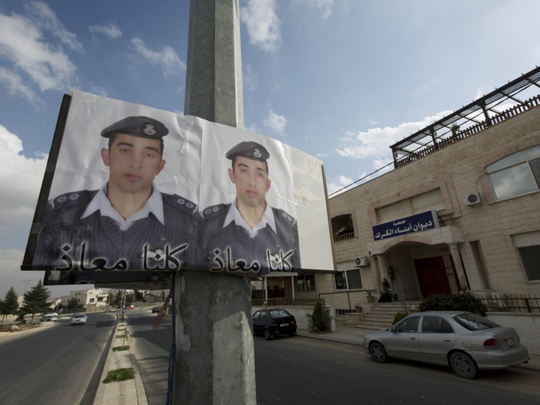
The Chicago Tribune calls the murder of Muath Al Kaseasbeh an “outrage”. “We hope it also proves to be a grave miscalculation. We hope the momentum against [Daesh or Islamic State of Iraq and the Levant] now intensifies. We want [Daesh] finished off, but know this war won’t end quickly. [Daesh] still holds vast territory across Syria and Iraq, including Mosul, one of Iraq’s largest cities. But there is progress: Kurdish fighters backed by airstrikes freed the Syrian city of Kobani. Iraq is trying to rebuild its forces to take on [Daesh], with support from Iran. And now there’s a jolt of focused anger over the pilot’s death.”
The New York Times talks of how the strategy of Daesh has boomeranged. “Terrorism has long had a gruesome role in conflicts, often among revolutionary groups so fanatically certain of their ends that they readily justify the most barbaric of means. But it can also turn with a vengeance against those who inflict it, as [Daesh] is learning with its most recently publicised atrocity — murdering a Jordanian air force pilot by burning him alive. The video of the killing was meant to dissuade Arabs from participating in the western coalition against the group; instead, it has succeeded in fostering rage and revulsion against the [terrorists] throughout the Arab world,” it concludes.
The Observer too believes Daesh has made a grave miscalculation in the way it hopes it can convince the Islamic world about its allegiance to their cause. “[Daesh] is also floundering in other areas, not least its always specious claim to be acting in the name of Islam. This repugnant contention has been roundly rejected by leading religious authorities across the Muslim world and by Sunnis from Egypt to Turkey who abhor the group’s reliance on sectarian violence, though [Daesh] claims religious legitimacy through its interpretation of the actions of prominent Muslim figures drawn from history.”
The Baltimore Sun posits that the continual barbarism of Daesh will bring about its nemesis. Says its editorial, “The fact that Jordan has chosen to stand up to the challenge posed by [Daesh] despite the deep national trauma its people have just endured is a bright spot in a US strategy that has produced limited results. Coalition airstrikes have forced the militants to change their tactics on the ground and hindered their mobility to some extent, but the group still controls large swaths of territory in both Syria and Iraq and the toughest fighting on the ground still lies ahead.”
A distinctly different note, however, was struck by the New Zealand Herald, which believes Daesh remains unaffected by the backlash. “Jordan was early to join the West and Gulf states in trying to force back [Daesh] as it swept into Syria and Iraq. The failed negotiations, and the symbolic tit-for-tat executions, leave Jordan in an unenviable position. While the people are ostensibly united by the horrors of Al Kasaesbeh’s death, the havoc across the border with Syria and Jordan’s front-and-centre role now as enemy of [Daesh] could have longer term dangers for the regime.”




_resources1_16a31069e4e_small.jpg)







